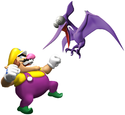Cractyl: Difference between revisions
(Undo revision 3532531 by 39.89.194.64 (talk) Which means?) Tag: Undo |
(→Haipō) Tag: Mobile edit |
||
| Line 61: | Line 61: | ||
|Jap=ハイポー<ref>「ワリオワールド任天堂公式ガイドブック」 (''Wario World Nintendo Kōshiki Guidebook''), [[media:WW Shogakukan P156.jpg|page 156]].</ref> | |Jap=ハイポー<ref>「ワリオワールド任天堂公式ガイドブック」 (''Wario World Nintendo Kōshiki Guidebook''), [[media:WW Shogakukan P156.jpg|page 156]].</ref> | ||
|JapR=Haipō | |JapR=Haipō | ||
|JapM=Possibly from "hypo"}} | |JapM=Possibly from "hypo" or a corruption of "hyper"}} | ||
===Houhou=== | ===Houhou=== | ||
Revision as of 19:16, February 6, 2022
| A proposal has decided that this page is to be split into the following: Cractyl, Bone Cractyl, Pigeon, Snow Bomber, Hawk, Haipō, Houhou. (discuss) |
A Cractyl[1][2] is a flying, googly-eyed, purple pterosaur in Wario World. Their name is a pun on pterodactyl. Since they possess the ability to fly, Wario must jump and punch them, or perform a Corkscrew Conk to hit them. Any of his strong moves can then be used. Cractyls' main attack is to lift Wario into the air and perform a move similar to the Piledriver, slamming him into the ground. However, this attack can be easily avoided if the player jiggles the Control Stick enough to free Wario. Starting in Greenhorn Ruins, Cractyls can also drop bombs to attack Wario. The bombs explode after a short time, damaging Wario if he is in the blast radius, but can be thrown back at enemies if Wario is fast enough. Starting in Beanstalk Way, Cractyls drop Spiked Balls instead of bombs, making them significantly more dangerous.
Aside from the basic Cractyls in Excitement Central, other varieties include Bone Cractyls[2] in Horror Manor, Pigeons[2] in Wonky Circus, Snow Bombers[2] in Shivering Mountains, Hawks[2] in Beanstalk Way, Haipō in the Mirror Mansion, and Houhou in Pecan Sands.
Gallery
Names in other languages
Cractyl
| Language | Name | Meaning | Notes |
|---|---|---|---|
| Japanese | プチラノドン[3] Puchi Ranodon |
Pun on「プチ」(puchi, petit) and "pteranodon" | |
| Italian | Cractilo[?] | Cractyl |
Bone Cractyl
| Language | Name | Meaning | Notes |
|---|---|---|---|
| Japanese | 骨ラノドン[4] Hone Ranodon |
Portmanteau of「骨」(hone, bone) and「プチラノドン」(Puchi Ranodon, Cractyl) |
Pigeon
| Language | Name | Meaning | Notes |
|---|---|---|---|
| Japanese | ポッポルン[5] Popporun |
From「ポッポ」(poppo, onomatopoeia for pigeon's cooing) |
Snow Bomber
| Language | Name | Meaning | Notes |
|---|---|---|---|
| Japanese | ユキルンルン[6] Yukirunrun |
From「雪」(yuki, snow) and possibly「ルンルン」(run-run, an adverb for "buoyantly") |
Hawk
| Language | Name | Meaning | Notes |
|---|---|---|---|
| Japanese | トビッチュ[7] Tobicchu |
From「鳶」(tobi, black kite) |
Haipō
| Language | Name | Meaning | Notes |
|---|---|---|---|
| Japanese | ハイポー[8] Haipō |
Possibly from "hypo" or a corruption of "hyper" |
Houhou
| Language | Name | Meaning | Notes |
|---|---|---|---|
| Japanese | ホウホウ[9] Hōhō |
From「鳳凰」(hōō, phoenix) and/or possibly「包帯」(hōtai, bandage) |
References
- ^ Wario World instruction booklet, page 24 (British English) or page 30 (American English).
- ^ a b c d e Stratton, Steve. Wario World: Prima’s Official Strategy Guide. Page 13.
- ^ 「ワリオワールド任天堂公式ガイドブック」 (Wario World Nintendo Kōshiki Guidebook), page 151.
- ^ 「ワリオワールド任天堂公式ガイドブック」 (Wario World Nintendo Kōshiki Guidebook), page 152.
- ^ 「ワリオワールド任天堂公式ガイドブック」 (Wario World Nintendo Kōshiki Guidebook), page 153.
- ^ 「ワリオワールド任天堂公式ガイドブック」 (Wario World Nintendo Kōshiki Guidebook), page 154.
- ^ 「ワリオワールド任天堂公式ガイドブック」 (Wario World Nintendo Kōshiki Guidebook), page 155.
- ^ 「ワリオワールド任天堂公式ガイドブック」 (Wario World Nintendo Kōshiki Guidebook), page 156.
- ^ 「ワリオワールド任天堂公式ガイドブック」 (Wario World Nintendo Kōshiki Guidebook), page 157.






